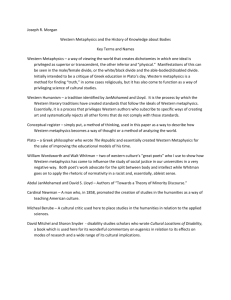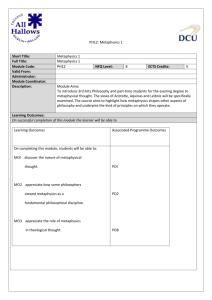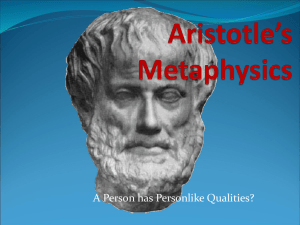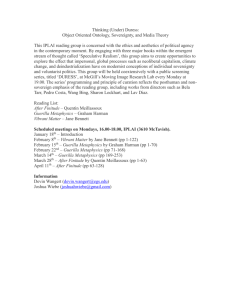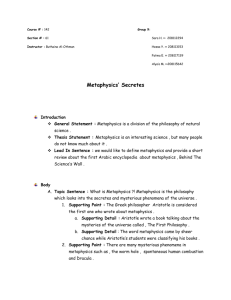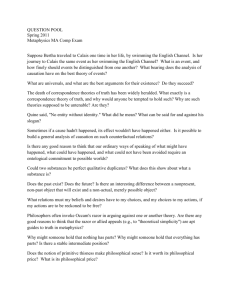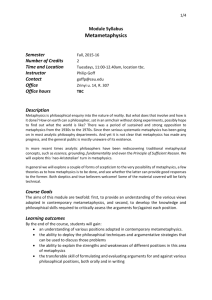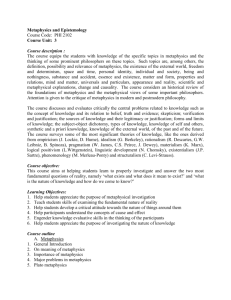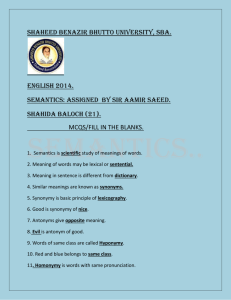GNOSEOLOGY: In Relation to Truth, Knowledge and Metaphysics
advertisement
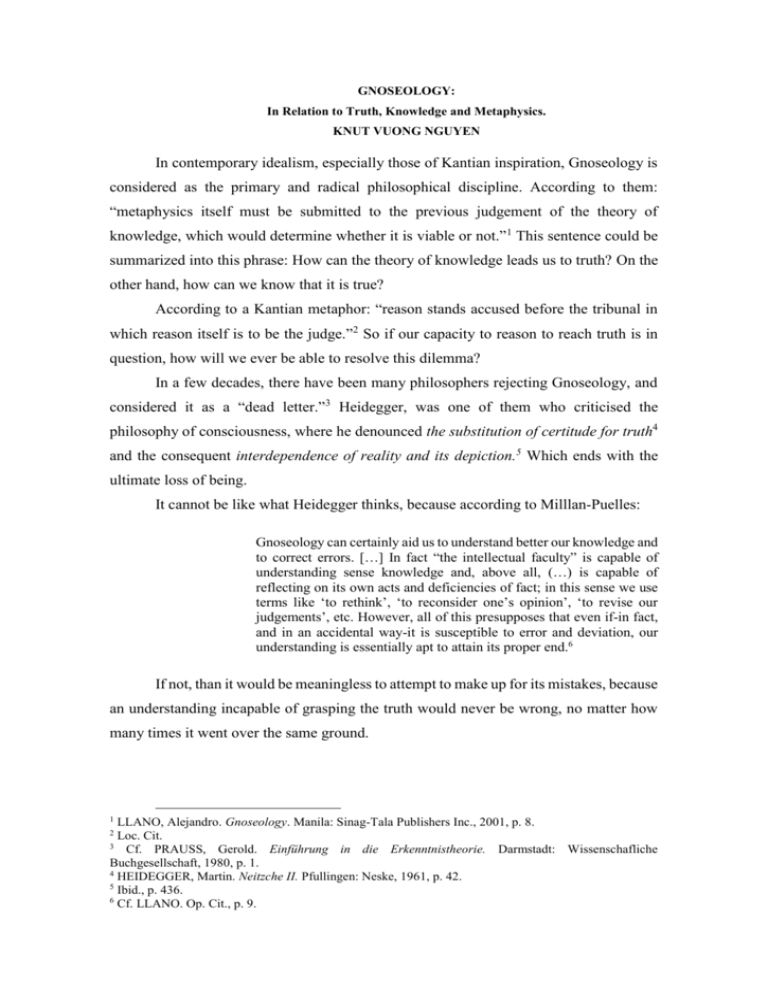
GNOSEOLOGY: In Relation to Truth, Knowledge and Metaphysics. KNUT VUONG NGUYEN In contemporary idealism, especially those of Kantian inspiration, Gnoseology is considered as the primary and radical philosophical discipline. According to them: “metaphysics itself must be submitted to the previous judgement of the theory of knowledge, which would determine whether it is viable or not.”1 This sentence could be summarized into this phrase: How can the theory of knowledge leads us to truth? On the other hand, how can we know that it is true? According to a Kantian metaphor: “reason stands accused before the tribunal in which reason itself is to be the judge.”2 So if our capacity to reason to reach truth is in question, how will we ever be able to resolve this dilemma? In a few decades, there have been many philosophers rejecting Gnoseology, and considered it as a “dead letter.”3 Heidegger, was one of them who criticised the philosophy of consciousness, where he denounced the substitution of certitude for truth4 and the consequent interdependence of reality and its depiction.5 Which ends with the ultimate loss of being. It cannot be like what Heidegger thinks, because according to Milllan-Puelles: Gnoseology can certainly aid us to understand better our knowledge and to correct errors. […] In fact “the intellectual faculty” is capable of understanding sense knowledge and, above all, (…) is capable of reflecting on its own acts and deficiencies of fact; in this sense we use terms like ‘to rethink’, ‘to reconsider one’s opinion’, ‘to revise our judgements’, etc. However, all of this presupposes that even if-in fact, and in an accidental way-it is susceptible to error and deviation, our understanding is essentially apt to attain its proper end.6 If not, than it would be meaningless to attempt to make up for its mistakes, because an understanding incapable of grasping the truth would never be wrong, no matter how many times it went over the same ground. 1 LLANO, Alejandro. Gnoseology. Manila: Sinag-Tala Publishers Inc., 2001, p. 8. Loc. Cit. 3 Cf. PRAUSS, Gerold. Einführung in die Erkenntnistheorie. Darmstadt: Wissenschafliche Buchgesellschaft, 1980, p. 1. 4 HEIDEGGER, Martin. Neitzche II. Pfullingen: Neske, 1961, p. 42. 5 Ibid., p. 436. 6 Cf. LLANO. Op. Cit., p. 9. 2 2 Looking at the scientific discoveries in the past, and how all the methods and precautions of science, implies that the fundamental certitude that truth is accessible in some way. There is a consequence to present knowledge, as the problem of whether or not truth and certitude can be attained is supreme naïveté, no matter what attempts it tries to disguise themselves with spectacular criticism. Because if we are going to doubt our knowing faculty, and to question if it is truly effective, than it seems to be senseless to try to use it to measure its own value. All those who adopts this critical position ends up against an inevitable obstacle: how can we possibly find out if our faculty of knowledge is ‘valid’ if, in any case, we have to use it to ‘validate’ itself in order to carry out our investigation? To clarify truth, will always be accompanied by the effort to dispel error. As the human intellect is normally oriented towards truth, but there is a fact that it is limited in some way, and some occasion, affected by improper moral dispositions of the subject. These errors affect even the first principles of knowledge.7 One example found in the old Greek, as Aristotle says that, “There are some, who maintain that a same thing both is and is not.”8 This kind of denial of the principle of noncontradiction is even found at present time, since “the overcoming of contradictions” is one of the basic elements of Marxist dialectic. It happens, therefore, that throughout history, the first principles and the most evident truths have been denied or deformed9 metaphysics, going deeper into the fundamental certitudes, has proceeded to refute such fundamental deviations.10 Aristotle, the first philosopher who made a serious and complete balance of the philosophical ideas developed by his predecessors and contemporaries. In doing so, he comes up against errors, which affect not only a specific truth, but also the totality of human knowledge. Some of the sophists, considering man to be “the measure of all things”, fell into relativism, which led to scepticism: to the paradoxical thesis that man cannot know truth. Aristotle, in a series of discussions pointed out with extraordinary acuity, both the internal difficulties of these theories, which lead to a dead end, and the negative practical consequences, which they entail.11 7 Cf. LLANO. Op. Cit., p. 11. ARISTOTLE, Metaphysics, IV, 4, 1005b, 35 – 1006a 1. 9 For example the reality of causality, the existence of the extra-mental world, the validity of moral norms… 10 Cf. LLANO. Op. Cit., p. 11. 11 Loc. Cit. 8 3 This defence of the value of human knowledge does not stop with Aristotle, because throughout a long process, it develops and enriches by scholars from classical and medieval philosophy. One example, worth mentioning, are the arguments of St. Augustine against them sceptics, to whose pretensions of universal doubt, the saint opposes, among other certitudes, the very existence of doubt: si enim fallor, sum [Even if I err, I am].12 St. Thomas defends the man’s capacity to know the truth of things, above all against the errors of his times: logicism, nominalism, Averrorism, etc. He holds to the unity of the truth, and the distinction and harmony of reason and Faith. He assigns human knowledge to the place which corresponds too it, as far from exaggerated rationalism as from a fideism which would deny the value of natural intelligence. The Gnoseology of St. Thomas Aquinas has the characteristic features of presenting a metaphysical realism in which being measure knowledge, and an anthropological realism according to which the human intellect attains to the truth of real things. This realistic tradition recedes historically into second place with the rise of the philosophy of consciousness, but its internal validity has survived the trial for centuries of profound cultural transformation to this present day.13 Altogether, the broadest and deepest study of the truth, in other words, of true knowledge, corresponds to metaphysics, as transcendental wisdom. Because, according to Aristotle saying that: “The consideration of the being in knowledge has a strict transcendental character, since it refers-in principle-to all of reality inasmuch as it is-or can be-known by this being which “is, in some measure, all things.”14 Therefore, Gnoseology studies being inasmuch as it is present in the human mind through knowledge, and inasmuch it is true. Moreover, it does not constitute a separate and special kind of study of knowledge, but is, rather, properly metaphysical. Therefore, Gnoseology should be considered as one of the principal parts pf metaphysics. 15 In other words, it is the metaphysical theory of knowledge. 12 AUGUSTINE, De civitate Dei, book XI, ch. XXVI. Cf. LLANO. Op. Cit., p. 12. 14 ARISTOTLE, De Anima, III, 8, 431b 21; Cf. Ibid., 5, 430ª 41 ss. 15 Along with ontology and natural theology. 13 4 According to García López, saying that Metaphysics is wisdom, […], the supreme science in the natural order; and therefore it cannot relinquish to any other science the defense or justification of its own proper principles. The principles on which metaphysics is based are the first principles of human knowledge attained, however, in their maximum universality and purity. No other science, apart from metaphysics, can take on the task of defending these principles. Moreover, it is metaphysics which provides to each science the most universal principles upon which it is based. To justify its own principles (showing their evidence and combating contrary reasoning) and to provide to other sciences the principles upon which they rest, is a mission which corresponds in full right to metaphysics in its quality as supreme science.16 Gnoseology is the metaphysics of truth. Its calm study has theoretical importance and vital relevance. This is true today, because it wards us against fundamental errors, which are very common now. For millennia, there is a tendency to look upon all knowledge, especially the knowledge of man.17 The value of truth-in-itself comes to be replaced by an approach in which truth has no meaning, if it has any at all, only as “truthfor-me”. In the face of this attitude, it is fitting to remember the words of the contemporary poet: “Your truth? No. the truth, and come with me to seek it. As for your truth…: keep it.”18 The conclusion is that do discover anew the value of truth, amounts to recovering being as the primary and original metaphysical value. It comprises, without a doubt, an intellectual task of great scope and with profound practical consequences. 16 LÓPEZ, García. METAPHYSICS, Gran Enciclopedia Rialp, vol. 15, p. 634. For example ethics, which ignores the reality of things and pays attention only to the ruling conventions, to subjective reactions or to pure pragmatic efficacy. 18 MACHADO, Antonio. Proverbios y Cantares, LXXXV. 17

